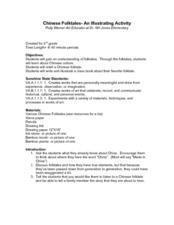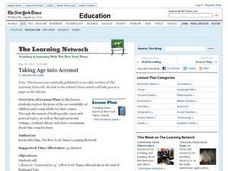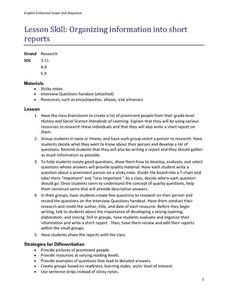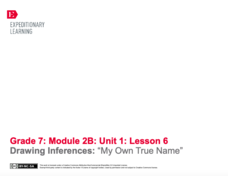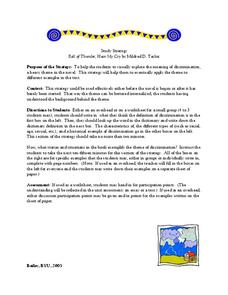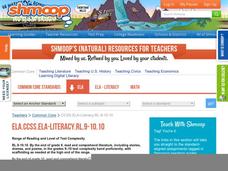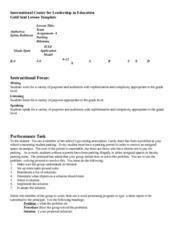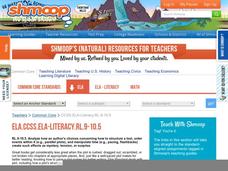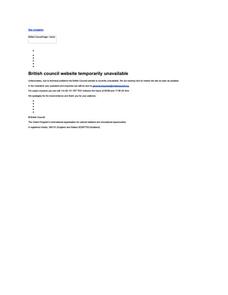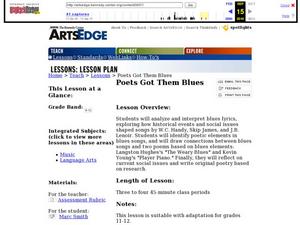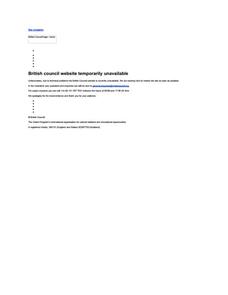Curated OER
Don't Believe the Type: Internet Ethics
What is Internet fraud? Explore Internet ethics and engage in a collaborative discussion. In order to create a Guide to Internet Honesty, learners read and discuss the article "A Beautiful Life, A Tragic Death, a Fraud Exposed." Then...
Curated OER
Talking Heads
After processing notes from research or an interview, middle schoolers turn the information into a script or dialogue for narrative, persuasive, or expository text. Use this lesson in any writing unit to reinforce proper writing skills.
Curated OER
Chinese Folktales: An Illustrating Activity
In need of a really good lesson that incorporates literature, art, and cultural themes? After hearing a traditional Chinese folktale and discussing cultural themes and symbolism, learners create original illustrations for the story. This...
Curated OER
Taking Age into Account
Have your class consider the issue of minors' accountability for their crimes. They discuss specific cases and the general issue of juvenile crime in round table discussions. Use this lesson to emphasize the rules and individual roles...
Curated OER
Digital Storytelling
Scholars of all ages can use the various tools of technology to construct and illustrate a story. Utilizing this resource, learners work with a partner to brainstorm and draft a story based on personal experience. They use computer...
Curated OER
Pizza Biography
A biography writing lesson with a tasty twist! Kids create a "visual biography" in which each pizza slice represents a paragraph, and toppings represent supporting details. They learn research techniques, note-taking skills, and how to...
Curated OER
Yakety-Yak
Do talk back! The transcript of one side of a telephone conversation launches a study of dialogue. Class members imagine the response of the speaker on the other side of the conversation and record these responses on the provided...
Curated OER
Organizing Info into Short Reports
The class brainstorms a list of prominent people from their knowledge of social studies. Groups of two pupils get together and select one of these people to research. They create five questions to research on their person and record them...
EngageNY
Drawing Inferences: “My Own True Name”sl.7.1
How much are you worth? Scholars read text dependent questions, and discuss how the text relates to self worth. They then work with partners by having written conversation to make inferences about the text. For homework, pupils correct...
EngageNY
Final Performance Task: Sharing Visual Representations of Position Papers
Take note! Scholars use sticky notes to record information as they gallery walk to look at classmates' visual representations they created for their end of unit assessment. Learners then choose one word that represents the work they...
EngageNY
Forming a Research-Based Claim: Stakeholder Chart on Better Agricultural Water Management
How can industries manage water more sustainably? Building on the previous activity, scholars explore the topic by creating a stakeholder chart for agricultural water management. Next, they participate in the World Café discussion...
Novelinks
Roll of Thunder, Hear My Cry: Study Strategy
Readers of Roll of Thunder, Hear My Cry expand their understanding of discrimination by using the provided graphic organizer to record the definition of the word, characteristics of and different types of discrimination, as well as...
EngageNY
Choosing a Position: Screen Time and Adolescents
Time to pick a side! Building on the Fishbowl activity from the previous instructional activity, scholars choose a position about whether the American Academy of Pediatrics should raise its screen time recommendations. Using notes,...
EngageNY
Finding Relevant Information and Asking Research Questions: The Big Thirst
Let's get to the gist. As scholars continue their study of Charles Fishman's The Big Thirst, they practice writing the gist of the text. Additionally, pupils add notes about the industrial uses of water to their researcher's notebooks.
EngageNY
Planning Content of Informative Consumer Guide: The Issue of Overfishing and Fish Depletion
Let's get organized! Pupils organize the information they have gathered about overfishing into a Quote Sandwich graphic organizer in preparation for their informative consumer guides. Next, they engage in a pair share activity to discuss...
Curated OER
What Makes Jokes Funny?
Explore how language is used for comic effect. Middle schoolers determine which of the three formulas for jokes (double meanings, unexpected outcome, humorous mental image) make each of 18 classic, corny examples funny. They complete a...
Curated OER
Justice for All
A reading of Roald Dahl’s Lamb to the Slaughter opens a discussion of justice and fairness. Using a Venn diagram and an Idea Wheel graphic organizer, class members consider the similarities and differences in these two terms. They then...
Shmoop
ELA.CCSS.ELA-Literacy.RL.9-10.10
How do you assess what your pupils have learned over the course of the year? Find out how competent they are at reading and analyzing age-level literature with the ideas presented here. Included in this resource are two suggested...
Curated OER
Team Assignment - A Parking Dilemma
Class groups are challenged to solve the school’s parking problem. Each team must establish ground rules for their discussion, determine criteria that must be met, and brainstorm possible solutions. Next, they agree on one solution and...
Shmoop
ELA.CCSS.ELA-Literacy.RL.9-10.5
Your young scholars already know when they like a story and when they don't, but they may not know that the plots of these stories are shaping that opinion. Like all resources in this series, the two activities and quizzes provided here...
Maryland Department of Education
The Concept of Diversity in World Literature Lesson 10: Author's Purpose Seminar
Why did Chinua Achebe write "An Image of Africa: Racism in Conrad's Heart of Darkness" in response to Conrad's novel? As part of a study of Things Fall Apart, class members conduct a socratic seminar focused on Achebe's purpose and...
Curated OER
Simple Texts for Primary Pupils
Can literacy get any more fun than this? Learners not only have fun, but gain confidence as well when presented with familiar text in another language. Select books, songs, poems, even recipes written in another language, and using the...
Curated OER
Poets Got Them Blues
Contemplate what music learners listen to and why they listen. Can they find poetry within music lyrics? Specifically hone in on blues lyrics and ruminate upon the social issues prevalent in the themes. Particular song lyrics coincide...
Curated OER
Teaching Numbers with Primary Pupils
One, two, three. Un, deux, trois. Eins, zwei, drei. Primary learners love to count and this lesson contains a series of games that encourage learners to count in English, French, German, and Spanish. The exercises develop literacy and...




